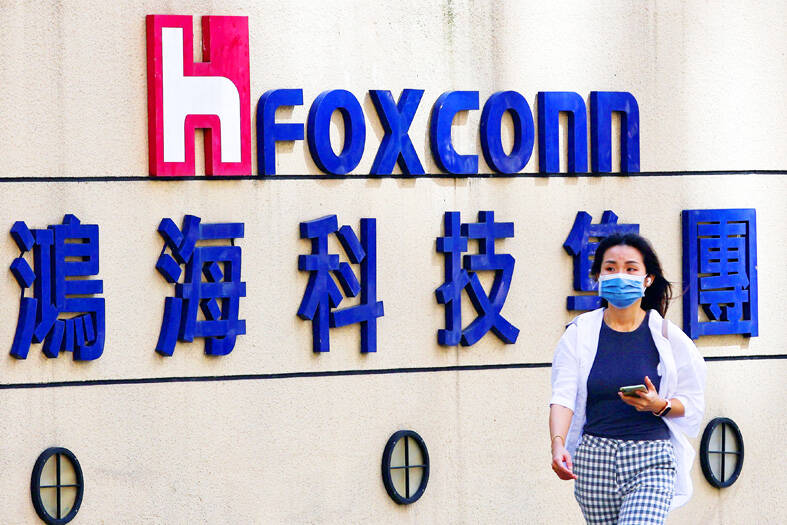Foxconn Technology Group (富士康科技集團) has ended a months-long “closed loop” system at the world’s biggest iPhone factory in central China, citing Beijing’s nationwide loosening of its “zero COVID” regulations.
Earlier this week, the Chinese government rolled back most mass testing and lockdown requirements to hasten a return to normal life, significantly relaxing three years of disease prevention restrictions that have tanked its economy and wearied its population.
The Foxconn facility in Zhengzhou City was in effective lockdown for 56 days, with workers only allowed to travel between their dormitories and the factory floor on shuttle buses after cases were discovered in October.

Photo: Ann Wang, Reuters
In the middle of last month, violent protests by new recruits erupted over salaries and conditions, with hundreds marching, and some clashing with riot police and health workers.
The company on Thursday said it was ending the closed loop system.
“Given the ... further lifting of China’s epidemic control measures, the company requires employees to present a 48-hour negative test result in order to return to work,” a notice posted on Thursday on the WeChat account of Foxconn’s main campus in Zhengzhou, Henan Province, said.
The company added that its shuttle buses had resumed service and urged employees who had not been taking part in the closed loop to return to work “as soon as possible.”
Other WeChat accounts of agencies hiring for Foxconn also announced that the “closed loop is lifted.”
Foxconn, known as Hon Hai Precision Industry Co (鴻海精密) in Taiwan, is the world’s biggest contract electronics manufacturer and assembles gadgets for many international brands.
Most of its factories are in China, with its biggest in Zhengzhou — which has been dubbed “iPhone city.”
Lockdowns were imposed in the city last month as part of Beijing’s “zero COVID” policy after a spike in infections.
The prolonged factory disruption and protests heavily impacted Foxconn’s hiring practices and rocked supply chain stability, to which Beijing attaches high importance.
A letter sent by Foxconn founder Terry Gou (郭台銘) warning the Chinese leadership about the damage to supply chains from the “zero COVID” policy helped government advisers argue for an end to the policy, the Wall Street Journal reported on Thursday, citing people familiar with the matter.
Foxconn’s reported revenue last month fell 11.4 percent year-on-year and 29 percent from October.
It earlier said it was revising down its outlook for the fourth quarter.
Some analysts have predicted sales could drop as much as 20 percent.

Taiwanese suppliers to Taiwan Semiconductor Manufacturing Co. (TSMC, 台積電) are expected to follow the contract chipmaker’s step to invest in the US, but their relocation may be seven to eight years away, Minister of Economic Affairs J.W. Kuo (郭智輝) said yesterday. When asked by opposition Chinese Nationalist Party (KMT) Legislator Niu Hsu-ting (牛煦庭) in the legislature about growing concerns that TSMC’s huge investments in the US will prompt its suppliers to follow suit, Kuo said based on the chipmaker’s current limited production volume, it is unlikely to lead its supply chain to go there for now. “Unless TSMC completes its planned six

Power supply and electronic components maker Delta Electronics Inc (台達電) yesterday said second-quarter revenue is expected to surpass the first quarter, which rose 30 percent year-on-year to NT$118.92 billion (US$3.71 billion). Revenue this quarter is likely to grow, as US clients have front-loaded orders ahead of US President Donald Trump’s planned tariffs on Taiwanese goods, Delta chairman Ping Cheng (鄭平) said at an earnings conference in Taipei, referring to the 90-day pause in tariff implementation Trump announced on April 9. While situations in the third and fourth quarters remain unclear, “We will not halt our long-term deployments and do not plan to

‘SHORT TERM’: The local currency would likely remain strong in the near term, driven by anticipated US trade pressure, capital inflows and expectations of a US Fed rate cut The US dollar is expected to fall below NT$30 in the near term, as traders anticipate increased pressure from Washington for Taiwan to allow the New Taiwan dollar to appreciate, Cathay United Bank (國泰世華銀行) chief economist Lin Chi-chao (林啟超) said. Following a sharp drop in the greenback against the NT dollar on Friday, Lin told the Central News Agency that the local currency is likely to remain strong in the short term, driven in part by market psychology surrounding anticipated US policy pressure. On Friday, the US dollar fell NT$0.953, or 3.07 percent, closing at NT$31.064 — its lowest level since Jan.

The New Taiwan dollar and Taiwanese stocks surged on signs that trade tensions between the world’s top two economies might start easing and as US tech earnings boosted the outlook of the nation’s semiconductor exports. The NT dollar strengthened as much as 3.8 percent versus the US dollar to 30.815, the biggest intraday gain since January 2011, closing at NT$31.064. The benchmark TAIEX jumped 2.73 percent to outperform the region’s equity gauges. Outlook for global trade improved after China said it is assessing possible trade talks with the US, providing a boost for the nation’s currency and shares. As the NT dollar